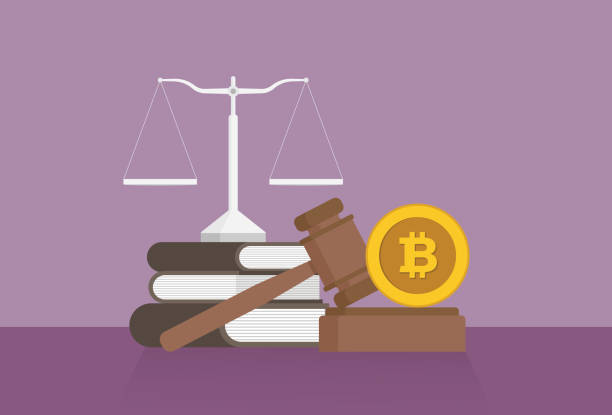Introduction
Blockchain technology has evolved from a niche cryptocurrency solution to a groundbreaking tool that is shaping various sectors, especially the legal industry. With the rise of digital contracts and smart agreements, blockchain’s influence on contract management, execution, and enforcement is undeniable. But what happens when blockchain intersects with the law? How do blockchain regulations affect the creation and operation of these digital agreements? This article delves into the intricate relationship between blockchain laws and digital contracts, highlighting how legislation is impacting smart agreements, execution processes, and more.

Understanding Blockchain Laws and Their Impact on Digital Contracts
The concept of blockchain laws encompasses the legal frameworks that govern the use of blockchain technology. These laws aim to ensure that blockchain transactions are legitimate, secure, and compliant with existing legal systems. However, digital contracts, powered by blockchain, present unique challenges. Unlike traditional contracts, digital agreements often rely on automation, transparency, and decentralized networks to enforce terms.
The Role of Blockchain in Digital Contracts
Digital contracts, also known as electronic agreements or e-contracts, are contracts that are executed and enforced digitally. These agreements utilize blockchain’s immutable ledger to record all transaction details, ensuring both transparency and security. Blockchain technology, with its decentralized nature, eliminates the need for intermediaries, such as lawyers or notaries, which can reduce costs and speed up the process.
Smart contracts, a subset of digital agreements, are especially noteworthy. These contracts are self-executing agreements where the terms of the agreement are written directly into code. When predefined conditions are met, the contract executes automatically. For example, if a payment is made, a smart contract could release ownership of digital property to the buyer without further human intervention. However, the legal validity and recognition of these contracts depend on how blockchain regulations are framed.
Blockchain Laws and Legal Framework for Smart Agreements
Smart contracts are an excellent example of how blockchain laws intersect with digital agreements. Blockchain legislation must evolve to address the challenges of enforcing these self-executing agreements in traditional legal systems. For instance, laws surrounding digital signatures and electronic agreements have had to adapt to validate blockchain-based contracts. While blockchain may make contracts more secure and transparent, these contracts are often created outside traditional legal jurisdictions, raising questions about enforceability and dispute resolution.
To address these concerns, many jurisdictions have begun to establish legal frameworks that define the role of blockchain in contract law. For example, some countries have passed laws that recognize the validity of digital signatures on blockchain-based contracts, ensuring that they hold the same legal weight as traditional paper contracts.
Decentralization and Jurisdiction Issues in Blockchain Contracts
A significant feature of blockchain is decentralization, where no central authority governs transactions. This is particularly relevant when it comes to jurisdiction in digital contracts. Traditional contracts often rely on courts and legal systems in specific jurisdictions to settle disputes. However, smart contracts operate across borders and can be executed in a decentralized manner, making jurisdictional disputes more complex. Blockchain laws are evolving to address these challenges by defining how and where blockchain-based contracts can be enforced.
Blockchain and Contract Execution
The automatic execution of contracts is one of blockchain’s most revolutionary features. With blockchain, contract terms can be programmed to execute as soon as conditions are met. For instance, a payment made through blockchain technology can trigger an automatic transfer of ownership of goods or services. Blockchain ensures that these transactions are secure, transparent, and immutable.
However, the legal implications of such automated processes are still developing. Legislators are working to create rules that ensure the enforceability of smart contracts and their compliance with existing contract law. As blockchain regulations continue to evolve, the ability to automate contract execution with full legal recognition will become a reality.
Legal Validity and Enforceability of Smart Contracts
One of the primary concerns surrounding blockchain-based contracts is their legal validity. Traditional legal systems are built around paper contracts that are signed by parties and notarized. Smart contracts, however, often operate automatically, with no physical signatures or human intervention.
Blockchain laws are being crafted to provide clear guidelines on how to handle the legal enforceability of these contracts. Many jurisdictions now recognize digital signatures and acknowledge the validity of blockchain-based contracts, making it easier for businesses and individuals to rely on smart agreements for legally binding transactions.
Blockchain and Legal Compliance
Blockchain technology presents unique challenges for regulatory bodies, especially when it comes to ensuring legal compliance. Blockchain’s decentralized nature can complicate regulatory oversight, as there is no central authority controlling the network. As a result, lawmakers are working to create blockchain regulations that provide clear guidelines for compliance while balancing the need for innovation.
Smart contracts and blockchain technology can streamline legal processes by reducing the need for intermediaries, lowering costs, and increasing efficiency. However, compliance with existing financial, privacy, and data protection laws is a must. Blockchain regulations will continue to evolve to address these challenges, ensuring that blockchain can be used safely and effectively within legal frameworks.
Blockchain in Contract Management and Dispute Resolution
Blockchain is also transforming how contracts are managed and disputes are resolved. With blockchain’s transparent ledger, contract management becomes more efficient, as all parties can track contract terms and conditions in real-time. Additionally, in the event of a dispute, blockchain-based contracts can offer an added layer of transparency to help resolve conflicts without the need for lengthy litigation.
Smart contracts can also include built-in dispute resolution mechanisms, such as automatic arbitration, reducing the time and cost typically associated with resolving contract disputes. As blockchain regulations continue to evolve, these dispute resolution features are likely to become more integrated into traditional legal systems.
Conclusion
The intersection of blockchain laws with digital contracts and smart agreements represents a significant shift in the way businesses and individuals approach contract law. Blockchain technology provides a more efficient, secure, and transparent method of executing agreements, but it also raises new legal challenges that must be addressed through appropriate regulations. As the legal landscape continues to adapt, blockchain’s impact on digital contracts and smart agreements will only grow, bringing about a new era of automated, decentralized, and legally sound agreements.

rzvq6q
kgrly0
ebtu4s
i6aqtk
j6dj22
ic2ft6
http://wish-club.ru/forums/index.php?autocom=gallery&req=si&img=5233
http://wish-club.ru/forums/index.php?autocom=gallery&req=si&img=5469
https://vitz.ru/forums/index.php?autocom=gallery&req=si&img=4809
http://wish-club.ru/forums/index.php?autocom=gallery&req=si&img=5329
http://passo.su/forums/index.php?autocom=gallery&req=si&img=4277
http://wish-club.ru/forums/index.php?autocom=gallery&req=si&img=5352
http://terios2.ru/forums/index.php?autocom=gallery&req=si&img=4663
https://myteana.ru/forums/index.php?autocom=gallery&req=si&img=6634
http://www.santa4.su/gallery/image/620-3/
http://toyota-porte.ru/forums/index.php?autocom=gallery&req=si&img=3234
lcluym
https://mazda-demio.ru/forums/index.php?autocom=gallery&req=si&img=6619
http://terios2.ru/forums/index.php?autocom=gallery&req=si&img=4683
http://wish-club.ru/forums/index.php?autocom=gallery&req=si&img=5368
http://terios2.ru/forums/index.php?autocom=gallery&req=si&img=4722
https://vitz.ru/forums/index.php?autocom=gallery&req=si&img=4973
«Руки Вверх» – Расскажи мне (Alex Curly Remix) скачать и слушать mp3 https://shorturl.fm/gckY5
Slava Marlow & Morgenshtern – Быстро скачать и слушать песню https://shorturl.fm/WMsX9
Подсолнух ( Алексей Кравченко и Руслан Абрамов ) – Ой Калина, Ой Малина ( 2005 ) скачать бесплатно и слушать онлайн https://shorturl.fm/FXzBm
Бабек Мамедрзаев – Принцесса скачать и слушать песню бесплатно https://shorturl.fm/k4Qba
SHEIX – Амнезия скачать и слушать песню https://shorturl.fm/MRNSC
Dante & DJ Tarantino – Не Перегорим (Temmy Remix) скачать песню и слушать бесплатно https://shorturl.fm/wOCYF
Мот feat. Zivert – Паруса скачать mp3 и слушать онлайн https://shorturl.fm/2voj3
Потап и Настя – Почему скачать песню бесплатно в mp3 и слушать онлайн https://shorturl.fm/dzG53
Ямаджи & Фейджи – Минимум скачать mp3 и слушать онлайн https://shorturl.fm/gqxED
https://vitz.ru/forums/index.php?autocom=gallery&req=si&img=5016
https://vitz.ru/forums/index.php?autocom=gallery&req=si&img=5005
http://terios2.ru/forums/index.php?autocom=gallery&req=si&img=4793
http://toyota-porte.ru/forums/index.php?autocom=gallery&req=si&img=3376
http://wish-club.ru/forums/index.php?autocom=gallery&req=si&img=5519
http://wish-club.ru/forums/index.php?autocom=gallery&req=si&img=5275
https://vitz.ru/forums/index.php?autocom=gallery&req=si&img=4870
https://vitz.ru/forums/index.php?autocom=gallery&req=si&img=4953
https://honda-fit.ru/forums/index.php?autocom=gallery&req=si&img=7334
Аккорд – Пингвины скачать mp3 и слушать бесплатно https://shorturl.fm/t4pdV
Михаил Ножкин – Последний бой скачать mp3 и слушать онлайн https://shorturl.fm/TSwNx
Лита – Не Твоя скачать песню в mp3 и слушать онлайн https://shorturl.fm/jO3kg
Jamala – ПОТАЙКИ скачать песню на телефон и слушать бесплатно https://shorturl.fm/3swwi
Алена Росс – Прости, Малыш, Я Больше Не Твоя скачать mp3 и слушать онлайн https://shorturl.fm/9sTdT
Kara – Откровенная скачать бесплатно mp3 и слушать онлайн https://shorturl.fm/qVnQ0
Jess – Выключим Коннект скачать песню на телефон и слушать бесплатно https://shorturl.fm/VBxKa
Алексей Брянцев – Сказка На Двоих скачать бесплатно mp3 и слушать онлайн https://shorturl.fm/fD49x
Руки Вверх! – Эни-Бени ( 2005 ) скачать бесплатно и слушать онлайн https://shorturl.fm/So3HO
Aihan – Тихий Океан (Orkenoff Remix) скачать и слушать онлайн https://shorturl.fm/7WLS9
KALVADOS – Краски скачать mp3 и слушать онлайн https://shorturl.fm/AjUQQ
Гудрон – Какие Вопросы скачать бесплатно mp3 и слушать онлайн https://shorturl.fm/UuOFW
Jahmal TGK feat. VibeTGK & Витя АК – Весна Весна скачать песню бесплатно в mp3 и слушать онлайн https://shorturl.fm/fAc8H
Lesa – За Тобой скачать песню и слушать бесплатно https://shorturl.fm/wVF8z
acciux
http://wish-club.ru/forums/index.php?autocom=gallery&req=si&img=5484
http://terios2.ru/forums/index.php?autocom=gallery&req=si&img=4850
https://vitz.ru/forums/index.php?autocom=gallery&req=si&img=4836
https://mazda-demio.ru/forums/index.php?autocom=gallery&req=si&img=6487
https://honda-fit.ru/forums/index.php?autocom=gallery&req=si&img=7301
https://vitz.ru/forums/index.php?autocom=gallery&req=si&img=4867
https://mazda-demio.ru/forums/index.php?autocom=gallery&req=si&img=6389
https://vitz.ru/forums/index.php?autocom=gallery&req=si&img=5024
http://wish-club.ru/forums/index.php?autocom=gallery&req=si&img=5508
Просто Лера – Не Звони скачать песню и слушать онлайн
https://allmp3.pro/2563-prosto-lera-ne-zvoni.html
Ольга Стельмах – Другая скачать песню и слушать онлайн
https://allmp3.pro/3301-olga-stelmah-drugaja.html
Kamazz – Паранойя скачать песню и слушать онлайн
https://allmp3.pro/2449-kamazz-paranojja.html
Boba Sheshera – Смуглая скачать песню и слушать онлайн
https://allmp3.pro/3153-boba-sheshera-smuglaja.html
Грета – Бумер скачать песню и слушать онлайн
https://allmp3.pro/3134-greta-bumer.html
MARIA – Селяви скачать песню и слушать онлайн
https://allmp3.pro/3206-maria-seljavi.html
Celine Dion – Love Of My Life (OST Люби Снова) скачать песню и слушать онлайн
https://allmp3.pro/2813-celine-dion-love-of-my-life-ost-ljubi-snova.html
Сергей Рудов – Июньские Цветы скачать песню и слушать онлайн
https://allmp3.pro/3210-sergej-rudov-ijunskie-cvety.html
jyrdox
9co43l
Can you be more specific about the content of your article? After reading it, I still have some doubts. Hope you can help me.
The text seems to be a mix of random characters and an English sentence. Here’s a comment in English based on the provided text:
The article was quite informative, but I feel like some parts were a bit unclear. It would be helpful if you could elaborate on the main points. I appreciate the effort, but I’m still left with a few questions. Could you clarify the purpose of the random characters at the beginning? WordAiApi
6i1dsp
Your point of view caught my eye and was very interesting. Thanks. I have a question for you.
9uq221
0tplw3
Good shout.
Thanks for sharing. I read many of your blog posts, cool, your blog is very good.
Thanks for sharing. I read many of your blog posts, cool, your blog is very good.
Nice
Nice
thc gummies for anxiety area 52
snow caps thca area 52
mood gummies area 52
best sativa thc edibles area 52
buy pre rolls online area 52
best sativa thc carts area 52
thc oil area 52
thc gummies for pain area 52
live rosin gummies area 52
live resin gummies area 52
live resin area 52
thc gummies for sleep area 52
live resin carts area 52
full spectrum cbd gummies area 52
thc tincture area 52
thca products area 52
thca diamonds area 52
best disposable vaporizers area 52
indica vape area 52
disposable weed pen area 52
infused pre rolls area 52
thcv gummies area 52
thc gummies
weed vape area 52
thca gummies area 52
indica gummies area 52
liquid thc area 52
liquid diamonds area 52
thca disposable area 52
hybrid gummies area 52